TWO days after winning the Gold Cup with Minella Indo, Barry Maloney told Nick Luck that the achievement hadn’t sunk in and probably wouldn’t for a long time.
It’s not quite two months yet but true to his prediction, Maloney is still struggling to quantify the experience of owning a Gold Cup winner but he says that two phone calls have made him understand and appreciate it a lot more.
“The first was from J.P. (McManus),” he reveals. “It was very kind of him and he just reminded me of the many horses he’s had in training for the length of time he’s been in the game and that he had just one Gold Cup and at that point, just one Grand National.
“I’ve only been in racing only a few years in comparison and I only have a handful of horses, so for this to happen so quickly, we feel extremely fortunate. It’s only when you listen to J.P. putting it in context, you actually realise how few people this happens to so we’re incredibly privileged.
“The second call I got was from Michael O’Leary and he said congratulations but you know now you’ve won a Gold Cup there’s only one way you can go. So there was a stark reality of that message as well!”
There is a fair bit of truth in both of those men’s comments, but McManus’s view hits home when you evaluate Maloney’s significant success from such a relatively small input.

Jack Kennedy celebrates passing the line in front on Minella Indo in the Gold Cup \ Healy Racing
He has the stats ready himself – he’s had just nine runs at Cheltenham of which he’s had two wins, three seconds and two fourths. And now, a Gold Cup winner with just his second runner in the race. But maybe such numbers shouldn’t be a surprise for a man whose highly successful business career has been made out of picking out the stars of tomorrow.
Maloney was reported to have made approximately €50 million when he sold his shares in Esat Digifone, of which he acted as chief executive officer, in 2000.
He then moved to start up the European office of the Silicon Valley-based Benchmark, an early stage venture capital firm which morphed into Balderton Capital, now one of the largest venture capital firms in Europe after a number of highly successful investments including in the burgeoning stages of Bebo, MySQL, Betfair and most recently Revolut.
He’s always said his business plan has revolved largely around backing and working with the right people, and that has shone through in his time as an owner of National Hunt racehorses, with his close alignment with Henry de Bromhead a huge factor in his enjoyment of Minella Indo’s Gold Cup.
Maloney’s passion for jumps racing was borne from his father and augmented by a yearly pilgrimage to Cheltenham. He has been labelled a Mayo native in some newspaper stories, but that’s only partly true because he’s lived in Dublin, London and intriguingly he spent the first 10 years of his life in east Jerusalem.

Barry Maloney (near) alongside brother Mike after Minella Indo won at Navan last year \ carolinenorris.ie
“Dad was a policeman here in the guards and when Ireland joined the United Nations in 1958 they sent 12 guards out to what was then Palestine as the first Irish contribution to the UN peace mission,” Maloney explains. “So he went out there and then my parents got married and we lived out there in the Middle East with them until we were 11 and then we all came home to boarding school here in Ireland.
“Dad used to come home here on his holidays and whenever he did, he was always looking out for where he could go to a National Hunt meeting – he was mad about it. When he married my mother, their honeymoon was three racecourses on the west coast of Ireland. My mother used to tell the story of how she was in the pouring rain, peering out of an umbrella as he ran from bookie to bookie in Ballinrobe and Sligo.
“That’s how we first became aware of jumps racing. My uncle Noel Lennon, my mother’s brother, he was mad into horses and greyhounds. I remember coming home from boarding school for the weekends and I’d stay with my grandparents and Noel would bring me up to Harolds Cross on the back of his Honda 50!”
When Maloney talks about his horses, he always uses the word ‘we’ referring to a team that started making the trip to Cheltenham 20 years ago.
“We have it block-booked out every year – we arrive on the Monday and come back home on the Saturday. It was always my brothers Michael and Alan, my good friends Eddie Gleeson and Rod O’Callaghan, uncle Noel and my dad.
“Dad passed away in 2016 but uncle Noel is 80 now but still comes with us and he’s just one of the lads. It’s a real group thing, if one of us isn’t there, it doesn’t feel the same.
“Cheltenham is everything for us. It’s just the event itself, the atmosphere, the sportsmanship, the collegiality. I’ve been lucky enough in that I’ve been to the World Cup Final, the Rugby World Cup Final, tennis tournaments all over the world, NFL games, the NBA, every major sporting event you could think of and in my book, nothing, absolutely nothing touches Cheltenham. Not even close.”
Rollercoaster
And even in a short space of time as an owner, Maloney has done the full rollercoaster ride at Prestbury Park in experiencing the ecstasy of Minella Indo’s 50/1 win in the Albert Bartlett, the “horrific” nature of the horse’s last gasp defeat in the RSA Chase last year, to reaching the pinnacle of National Hunt racehorse ownership when the eight-year-old combined with Jack Kennedy to strike Gold last month.
Of course he’d have loved to have been there with the usual crew but he didn’t let that take away from a phenomenal success, of which a large part of his exhilaration is for his trainer who played a role in providing a way into racing for him.
“I met Henry a long time ago,” Maloney recalls. “We got a syndicate together in college and rented a horse that was trained by his dad and then Henry. I always said then that if I ever had enough money to invest in racehorses, I’d like to work with Henry.
“I’d tried a few different models of buying horses and having them with a few trainers but as I figured out what I wanted to do, I had more and more discussions with Henry about what he wanted to do and there was this kind of connection I guess.
“I remember the first horse Henry recommended for me, which wasn’t a cheap horse, I think we paid about €80,000 for it but for one reason or another the horse didn’t work out. Henry came back to me and he said ‘Listen, I’m sorry, I made a mistake and I’m putting €10,000 into your training account because I got it wrong.’
“The minute he did that, as far as I was concerned, it was game over with regard to who I was going to work with because for a trainer to do that, in my experience, is off the charts, and it spoke to his honesty and his integrity.

Monalee has been a top class horse for Barry Maloney \ carolinenorris.ie
After various discussions, Maloney and de Bromhead sat down and constructed a change in strategy to source horses. The aim was to buy fewer horses but up the quality. Monalee was the first to come through and then Minella Indo.
It was fascinating to hear Maloney speak about de Bromhead in his interview on Luck On Sunday, most notably the insight he gave into those discussions he had with his trainer and about how de Bromhead should go to leverage his brand/franchise of the type of trainer he wanted to be.
“It was a huge shock to Henry when he lost all the Potts horses,” Maloney explains when asked to elaborate on those discussions. “If you think back to that time, Henry’s stable was relatively small. Alan Potts had maybe 30% or 40% of the horses including Sizing John, so when he moved his horses, it was a body blow. In fairness to Gigginstown and Michael O’Leary, they then came to support him, but initially Henry had come fairly exposed.
“I remember having a chat with him at the time and the model for him going forward was to have a better balance of owners so he’s not over reliant on any one owner.
“The way to do that was to have a reputation and a success record of winning the top graded races because frankly to go after a Gordon Elliott or a Willie Mullins in terms of number of horses in training and to try and beat them at that game is going to be very very difficult.
“Instead, he put the focus on the quality of horses inside the infrastructure and I think you saw the benefits this year.
“Henry has always said that he doesn’t necessarily want to be the biggest in terms of the highest number of horses in training. He wants to focus on fewer horses of higher quality and I think that’s the niche that he has now carved out for himself and it’s one I believe he can own.
“He has changed the landscape of the trainer’s pecking order and I think this is a defining moment for him. I couldn’t be more happy for him after what he has done over the last few weeks.”
Niche
Maloney has also talked about the niche Ireland has with the horse racing industry and how that should remain a priority for Government ahead of what could well be turbulent times economically and with that, the possibility of a less racing friendly Government coming into power.
“I admire what the Government and Horse Racing Ireland [HRI] have done for Irish racing,” he reiterates. “They figured out that for every euro the Government puts into the industry, they are getting back a 30-something return [Deloitte report in 2017].
“I’m in the venture business, and those are the entrepreneurs and tech companies I’m trying to back every day of my working life, where you can make 30 times your money. We have an engine in this country with the horse racing industry that delivers that for the taxpayer, so bring it in.
“If you think about the whole chain, through the point-to-point, through the stable hands, through the people that are involved in the breeding, it’s an incredible Irish success story.
“To me it was only a question of time that Ireland would emerge as we are now because with the government support, we’ve got the model right here. We are renowned internationally for horse racing and that’s a position, just like tourism, we have to protect, particularly coming out of Covid because it’s one of those industries where we have a natural advantage above any other country and we need to build on that and encourage it.
“It’s frustrating to hear members from Sinn Fein and other opposition parties knocking the sport because of their own perception of elitism. It’s nonsense. Those party members just want to throw rocks at the Government and see horse racing as an easy way of doing that. A lot of it is ignorance and a misunderstanding of the basic economics of how the industry works.
“No matter who is in government you would expect them to be economically aware enough to recognise what that the racing industry is, educate themselves and figure out how to encourage it. Whether or not those parties [whose members have called for a cut in funding to HRI] could ever do so from a philosophy point of view I don’t know, because they’ve parked themselves into a corner about elitism. National Hunt racing is as far away from elitism as you could get.”
With Horse Racing Ireland currently seeking a replacement for Brian Kavanagh as chief executive officer, Maloney says the next person in will have a crucial role to play, in light of those haranguing against racing, but there are other areas of concern as well. He was shocked to hear that there was only one racecourse in Ireland with a set of cameras in the stable yard, one of the main takeaways from the recent Charles Byrnes-Viking Hoard case.
He says that racecourse facilities on the whole still need to be improved and also expressed frustration at the amount of time it takes to adjudicate some cases, which “makes us look like complete amateurs.”
“Thankfully most of these cases are few and far between but when they do happen we have to deal with them quickly. All these things can be sorted once there is a willingness because we’ve a brilliant industry and our reputation is so important given what we’ve already discussed with regard to the government.”
Opportunities
Maloney says there are lots of opportunities going forward as well. Given it was his own way into ownership, it’s not surprising that he’s highly praiseworthy of HRI’s big push towards syndicates, “a fantastic way of introducing people to racing for relatively low cost.”
More intriguingly, he also sees huge marketing opportunities for jumps racing outside the confines of Britain and Ireland.
“I’m a bit colourblind when it comes to Irish racing as a whole as I just don’t get flat racing but I love National Hunt. I think America could be an incredible market to showcase the best of National Hunt racing in Ireland, the quality of the races and horses that we have, marketing that in the US and even China as well.
“I think there are incredible markets there that can be developed and bring more people into the sport.
“This has happened in flat racing, quite successfully, but National Hunt doesn’t seem to have gone that route and I wonder why because to me it’s more exciting, there’s more colourful characters in it and there are a lot of heart-stopping moments – good and bad.”
Maloney will be hoping for another good heart-stopping moment with Minella Indo in the Ladbrokes Punchestown Gold Cup this Wednesday. He reports the eight-year-old in fine form after his Cheltenham exertions and is looking forward to seeing him again.
Whatever happens now will be a bonus for Maloney and his gang because win, lose or draw, all roads will lead back to Cheltenham next season.
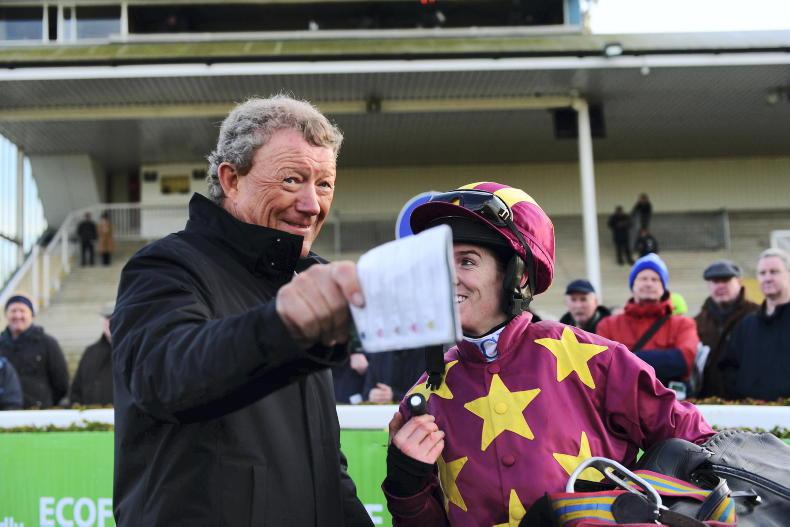

 This is a subscriber-only article
This is a subscriber-only article
 It looks like you're browsing in private mode
It looks like you're browsing in private mode




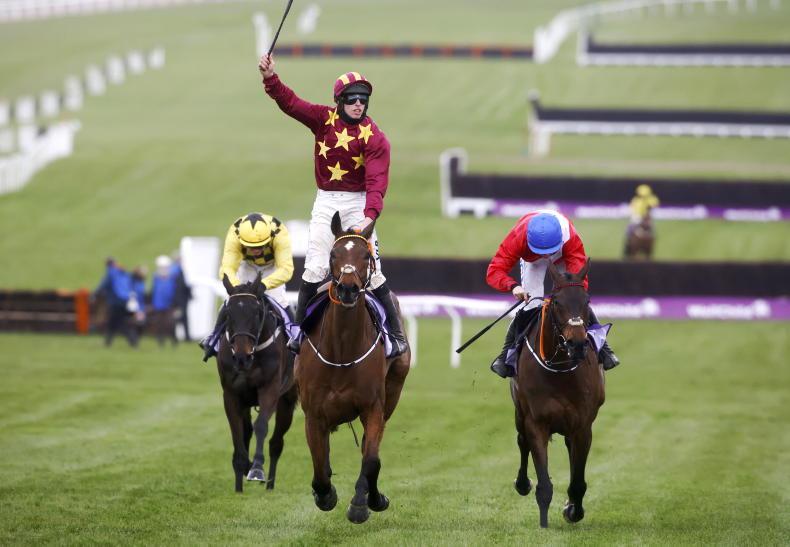
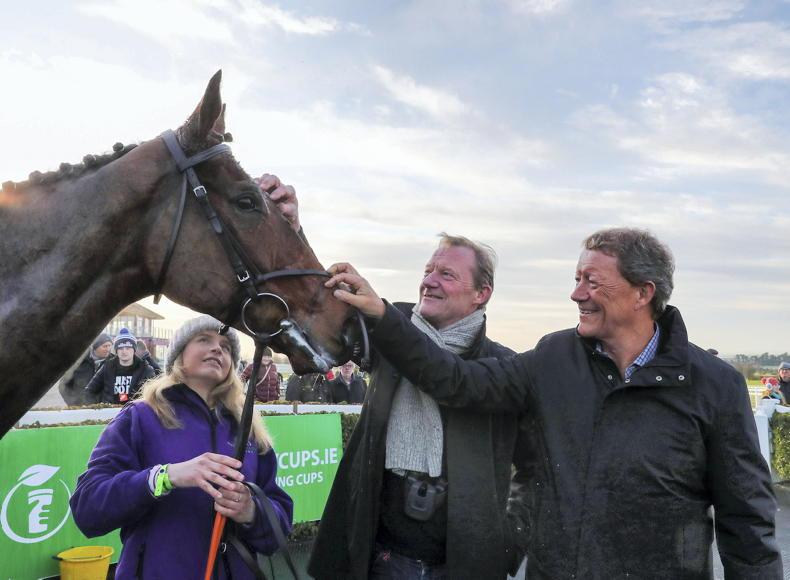
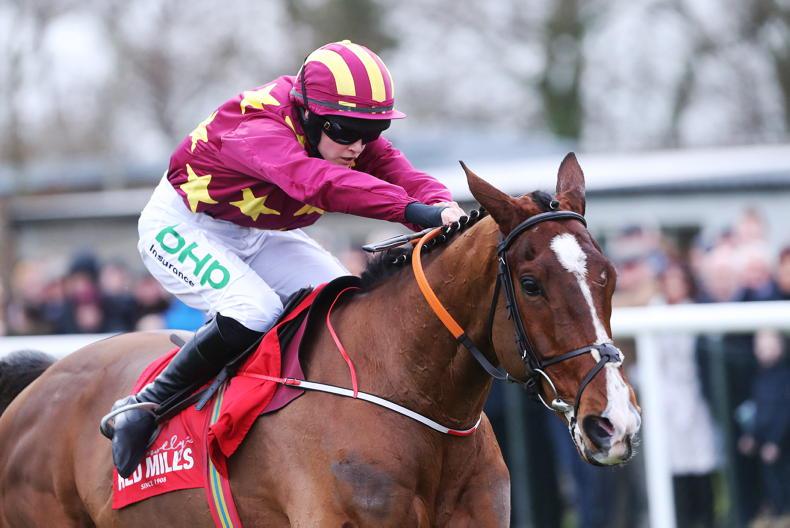

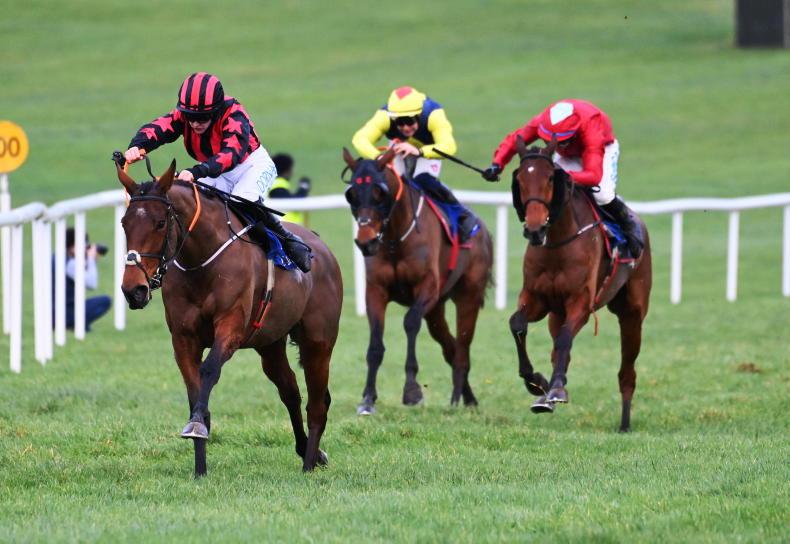



SHARING OPTIONS: